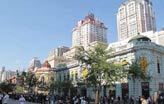Web Comments
China's political reform is done gradually on many fronts
Updated: 2011-06-16 10:46
By Chen Xuefei (chinadaily.com.cn)
My article published on April 19, Political reform paves way for economic growth, aroused some debate among our readers, and one critique is that the language is a bit outdated, talking only about the changes from the late 1970s to 2000. What about the recent decade?
In the past 10 years, China actually has been reforming in many aspects in incremental steps to keep a nation with a 1.3 billion population politically stable and economically dynamic.
|
||||
To provide housing for staff was a form of welfare provided by the government or the companies. This had been going on for 50 years, with worsening conditions. But by 2000, the welfare allocation of housing system was abolished in China.
In the spring of 2001, there was a real estate forum at Peking University. Some economists said, "We must let people buy apartments, buy cars and work hard. People should stop standing idle under the sun!" Many people worried that people will go into debt if they bought apartments and cars, but the economists held that once people had debt, they would have to work hard.
To stimulate people's enthusiasm about work, it was right to use market forces to create demand and meet that demand. The real estate industry created many billionaires and also drove other industries, such as interior decoration, construction material production and service industries, to new levels. Many more people enjoy living in a much broader apartment of their own!
It created chances for many people who are forward-looking and relatively rich. This was due to the determination of the government in reforming the housing system.
But the unleashing of the market force also caused problems: energy and resource efficiency was low, environment was severely damaged, people's single-mindedness in seeking money caused a lot of safety problems. The gap between the rich and poor became larger and larger. This was the side effect of market or private economy or a lack of better government supervision.Second, China proposed the policy of building a resource-efficient and environmentally friendly society as early as 2004, with a set of medium and long-term plans to solve the problems mentioned above.
President Hu Jintao put forward the scientific development view. That is to develop within the capacity of resources, balancing the population's demand and the bottleneck of resources.

Specials

Mom’s the word
Italian expat struggles with learning English and experiences the joys of motherhood again.

Big win
After winning her first major title, Chinese tennis star could be marketing ace for foreign brands

Markers of memories
Axe comes down on historical buildings as part of Harbin government’s baroque programs


